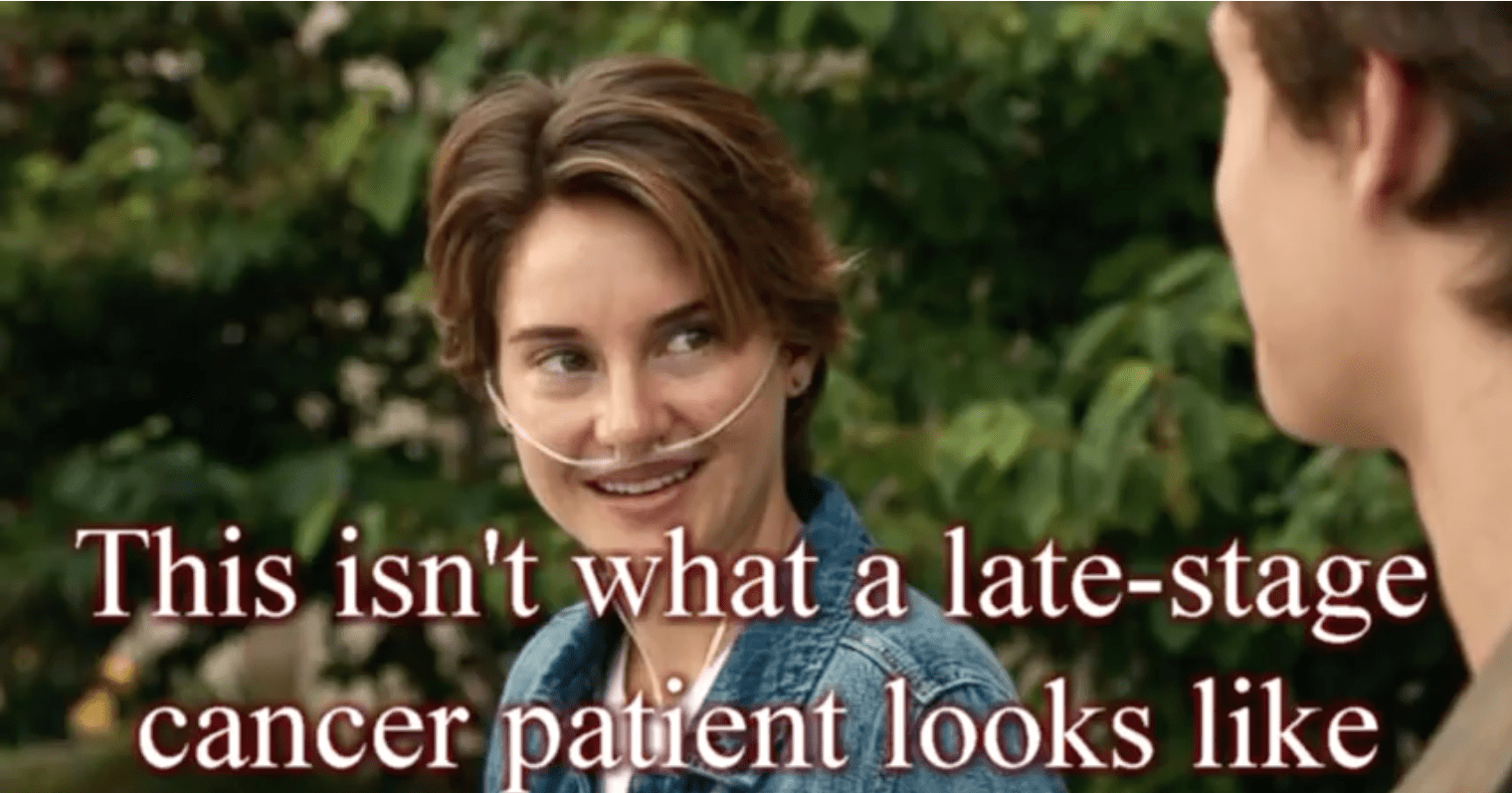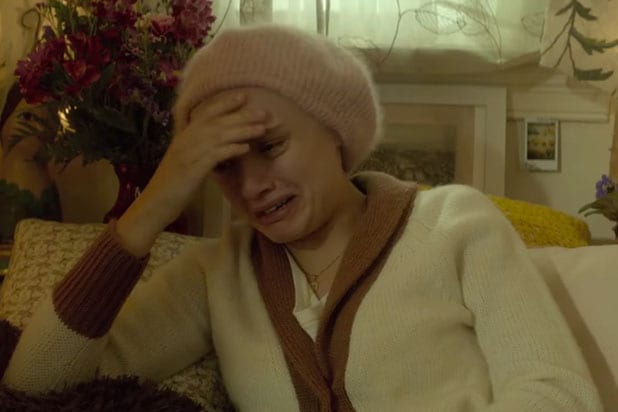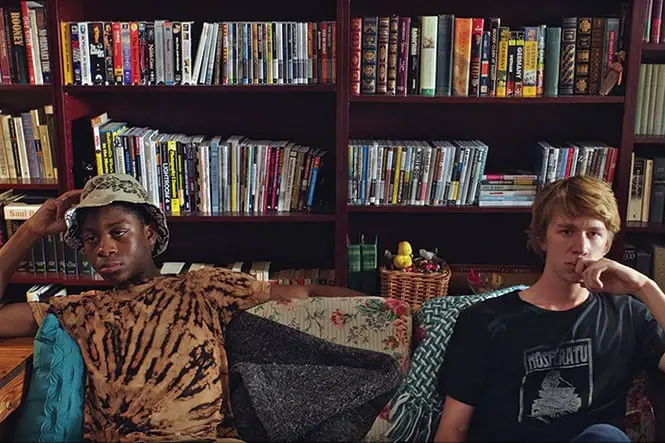Me and Earl and the Dying Girl is a 2015 American movie based on a book of the same name. It follows the senior year of high school of a boy called Greg. He is a master at being undetected by his schoolmates and uninvolved in their life. He has only one friend, Earl, with whom he shares a passion for pastiche movies, but most people don’t even know they are friends. All in all, Greg is pretty happy with his life up until the point where everything changes. His mother forces him to spend time with one of his schoolmates, Rachel, who has just been diagnosed with cancer.
The movie stars some very talented young actors that you have probably seen somewhere else (Olivia Cooke, Rachel, was in Ready Player One, RJ Cyler, Earl, was in Power Rangers 2017). The adults are also played by well-loved, relatively famous actors such as Nick Offerman (Parks and Recreation), Jon Bernthal (The Punisher), and Connie Britton (American Horror Story). Generally Me and Earl and the Dying Girl was very warmly welcomed. Most notably, it won the Grand Jury Prize (U.S) and the Audience Award (U.S) at the 2015 Sundance Film Festival.
But I’m not here to tell your that Me and Earl and the Dying Girl is a good movie both as a drama and as a comedy. I am rather more interested in talking about Me and Earl and the Dying Girl treatment of teenagers being terminally ill. Because this is something that is generally really poorly done, lost somewhere in-between romanticization and exploitation.
Sick-lit (Did Someone Actually Think This Name was a Good Idea?)
Sick-lit is first and foremost an unofficial literary sub-genre that features extremely ill or disabled character(s), very often young, and whose very plot relies on the character being sick or disabled. You probably have read or heard about some books that fit this description: The Fault in Our Stars, Me Before You, etc. The apparent editorial craze for written stories centering around sick characters spilled over into Hollywood and there are quite a few films that use the same tropes. It is not very surprising, then, that the two books mentioned above were made into movies. Movies that attracted controversies.
Me Before You made disabled rights activists seriously angry. And The Fault in Our Stars, while coming from the right place, has its own issues that can be boiled down to the way it mixes romance and terminal illness.
The main issue with sick-lit is that many of these stories end up romanticizing (no I won’t even talk about the exploitation issue this would take way to long) terminal illnesses. Or even romanticizing death, as the video that brought the issue to my attention explains so well. It is not always willingly from the creators’ part, it can be in a attempt to makes us relate more to the character, but their sick characters have often very little in common with actually ill people.

Long story short, for the young and impressionable, this kind of representation of ill people might make the idea of being sick, or even dying, cool or even the good decision to make (looking at you Me Before You). And it isn’t an issue because I want to police what people are writing. Rather, when you misportray something profoundly sad in order to make a romance more intense, you haven’t treated your subject with the care and respect it deserves.
In contrast the other films mentioned, this is something that Me and Earl and the Dying Girl actually does really well.
This is Not a Love Story
In France, Me and Earl and the Dying Girl came out under the title: This is Not a Love Story (Me and Earl and the Dying Girl). While I won’t even try to understand why French distributors decide to translate a film with a pre-existing English title with a different English title (I recognize the telltale signs of eldritch abominations when I see them), I think that for once our madness actually hit something pretty important. For, as opposed to the majority of sick-lit type stories, Me and Earl and the Dying Girl is not a love story.
Greg and Rachel might fall in love with each other (which isn’t made explicit in the movie with any great declaration of love), but they are never a couple. Mainly because there is a mountain of things standing between them and a romance. The most important one being Rachel’s cancer. While they actually grew close and Rachel manages to re-motivate Greg, she is getting worse and worse.

This means that she does and plans for fewer and fewer things as the movie progresses. First, because she is too tired and second, because she is in too much pain. Her cancer slowly robs her of her agency and her will to keep on going. Rachel isn’t in a relationship not because she isn’t living in the moment, like some sick-lit would want to you to believe, but because she can’t live in the moment. And she can’t live in the future either. Her illness takes her future away from her and prevents her from enjoying her present. As an example, close to the end of the movie Greg ‘takes’ her to prom but they don’t actually go to prom because she is in bed at the hospital.
In a sort of mirror way, it also makes Greg keep his distance from her. While Greg and Rachel met after Rachel’s diagnosis, they become friend while Rachel is still only moderately sick. As Rachel’s condition worsens, it gets difficult for Greg to be around her. Because he loves her and and watching her slowly dying is to much for a seventeen years old boy. So he does what a lot of teenagers facing unsurmountable obstacles do, he procrastinates spending time with Rachel and finishing her movie.
While in a lot of sick-lit the very possible tragic end makes the love story happen that much more passionately, in Me and Earl and the Dying Girl the tragedy kills the romance in the egg completely. Because Me and Earl and the Dying Girl remembers that truly being in a relationship requires time to build something. And Rachel doesn’t have the time or the strength.
The World Keeps on Going
Another thing that Me and Earl and the Dying Girl does wonderfully well is to prevent the story from being locked outside of the ‘timeline of daily life’. By this I mean that the movie doesn’t forget that despite the fact that Rachel is ill, the hours keep on passing and the high school bell keeps on ringing.
Greg and Earl still have the normal responsibility of teenagers. They have to be in class, do homework, find a college, etc. And of course it doesn’t go well, because the time they spend with Rachel, which absolutely must be now, clashes with their normal life. So Greg’s grades take a huge blow and his future college attendance is completely jeopardized. In a similar fashion, the long-standing friendship between Greg and Earl is seriously hurt by their disagreement about how to manage their time properly.

The adults around them try to help them of course. After all, it is Greg and Rachel’s mothers who started all this. But they also have their limits. It’s complicated to teach a 17-year-old how to grieve before he has to. It’ss also very frightening to imagine that the new friendship your son has might be responsible for him losing his own future. So the adult have quirks, they disagree, they try their best, but they have their failures too.
The ‘long time’ perspective is never lost in Me and Earl and the Dying Girl. ‘Real’ life keeps on going, no matter that Rachel is getting excluded it from it and will end up being excluded from the ‘long time’ as well. The point here is to remind us of what death is and what it does to both the people who die and the ones that remain: rob them of their potential. It’s about grieving. How you will spend the rest of your life with the knowledge that the person you loved is gone and that you will never see them again. Me and Earl and the Dying Girl never forgets this, and this is one of its best storytelling decisions.
Conclusion
While it can be said that Me and Earl and the Dying Girl is maybe a bit too much about Greg and not enough about Earl, and most notably not enough about Rachel, it is still an excellent movie. It is a well-written, well-directed, well-acted dramatic comedy. It also has the best portrayal of illness I have seen in a teen movie. So if you feel like crying, give it a chance.
All images courtesy of 20th Century Fox.

